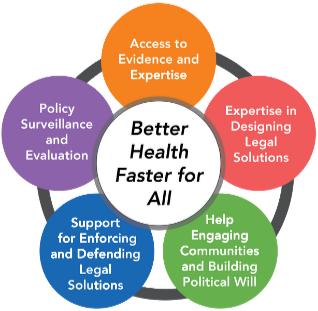 Public Health Law
by
Montrece Ransom (Editor); Laura Valladares (Editor)
Public Health Law
by
Montrece Ransom (Editor); Laura Valladares (Editor)
ISBN: 9780826182036
Publication Date: 2020-11-28
"This book is very well researched, organized, documented, and referenced. The case studies are relevant to specific public health issues related to race, gender, equity, sexual orientation, poverty, homelessness, drug addiction, and chronic diseases facing U.S. populations in the 21st century. The book offers background information for professionals to try to analyze the root causes and develop public health measures to ameliorate these problems." ---Doody's Review Service, 4 stars Public Health Law: Concepts and Case Studies is a practical textbook for students of public health and health policy with comprehensive coverage of core concepts in law across public health sectors. The text builds upon the understanding that law is a significant determinant of health while highlighting essential knowledge of legal issues and laws affecting public health outcomes. Chapters address major topics in United States public health law and take a competency-based approach influenced by models developed by the CDC's Public Health Law Program. The book describes the most important and relevant considerations of the law through case studies and real-world examples that students and practitioners of public health need as a baseline in order to mitigate health inequities and public health threats. Written with a basis in health equity, chapters also include call-out boxes to appropriate health equity related principles and theories. The book's three parts explore law as a foundation for public health practice, law in everyday practice, and law as a transdisciplinary public health tool. It addresses key legal concepts such as the sources of authority in the United States legal system, constitutional foundations, limitations of authority, regulation, and litigation as they relate to public health. The most prevalent public health law topics and national public health strategies are covered in clear prose and offer guidance on the law and legal issues related to immunization, infectious disease control, chronic disease prevention and management, unintentional and intentional injury prevention, emergency law, global public health, environmental law, LGBT populations and the law, women's reproductive health topics and more. Hypothetical case studies throughout illustrate how law impacts public health practice across a variety of settings and populations. Content on the transdisciplinary nature of public health practice spans topics such as law as a social determinant of health, the Health in All Policies initiative, legal epidemiology, law and ethics, and the scope of public health decision-making. Insightful and practical in its approach, Public Health Law: Concepts and Case Studies provides students and public health practitioners alike with knowledge and tools for utilizing the law to advance public health goals in the communities they serve.Key Features: Includes practical, real-world case studies illustrating the intersection of law and public health in many different contexts Highlights health equity and social justice issues relevant to chapter topicsExplains legal frameworks and challenging legal concepts in easy to read proseHighlights relevant legal issues and considerations during the COVID-19 pandemicIncludes access to the fully downloadable eBook as well as instructor ancillary materials such as Instructor's Manual, PowerPoints, and Test Bank


